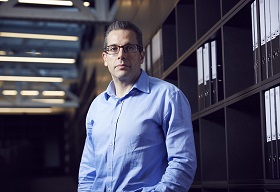Real estate in the augmented age
Matthew Weiner, Chief Executive of U+I, has written about the real estate sector in the age of augmented reality.
As I sat in my synagogue celebrating Jewish New Year recently, my rabbi was talking of robotics. In particular, he was telling us about the Bless U2 robot: not a mechanised fan of an Irish rock group, but an android that can bless you in five languages, has a touch screen to answer your theological questions and raises its arm at inspirational moments.
I don’t think my rabbi felt his job was under threat, but it underlined to me just how much robotics and artificial intelligence (AI) is extending into every aspect of our lives.
In real estate, most of the AI technology has been used in the fields of property management and building automation, largely driven by a desire to control and reduce costs. That’s fine and important, but not particularly inspiring. It also misses a bigger point.
At U+I, we do not just think in terms of buildings, but of places, of communities. Communities are all about connections. Connections between people, between places, between the past and the present.
It seems to me that AI, machine learning and robotics may have an important role in helping us understand these connections before and after we develop the places that we want to turn into communities. If we can analyse what local people are looking for on their search engines, we might understand their wants and needs better in designing our projects. All manner of data from a myriad of sources can help create a better picture of the way people interact with each other and with a place.
We are already getting better at understanding the way people use buildings, and see some disruptive trends emerging.
First, connectivity is key. Be it shopping centre apps, automated warehouses or smart homes, digital connectivity is now just as important as physical connectivity.
Second, the demand for a personalised service is growing. Shoppers are being sent targeted offers on their mobiles, while office occupiers are putting a greater premium on the look and feel of their workplaces in the war for talent.
Finally, convenience has become a top priority. One-hour delivery services and click and collect have transformed the retail and logistics sectors with time emerging as an increasingly precious commodity for today’s time poor consumers.
As such, buildings need to be more adaptable as working styles and social habits change and new technologies become available.
But while the technological future is exciting and bright, we also need to exercise some caution. Ours is not, after all, a binary business. It Is not always a 1 or 0, a question of right or wrong, a simple easy answer. Good development can and should be guided by data but it is inspired by values. In our case, those of intelligence, imagination and audacity.
Take Landmark Court in Southwark, a project U+I is working on in partnership with Transport for London who own the land. To look at it is just an abandoned car park next to a railway line with a derelict bit of green space round the corner. But that piece of green space is in fact the Cross Bones Graveyard – an historic cemetery for prostitutes and paupers.
This park is much loved by the local community and will be an important factor as we bring the scheme forward. How we preserve this and work it into a wider plan is not clear. We will need to have a vision and as Jonathan Swift said: 'Vision is the art of seeing things invisible'.
Humans can do that; algorithms can’t. Place is always going to be more than just a lump of land.
So while AI, augmented reality and other advances will teach us much and guide us to a greater understanding of how to achieve a vision, Bless U2 is going to have to leave it to my rabbi to guide us humans and our weird, irrational and wonderful visions of how we can all live in a better world in a better way.
This article was originally published on 1 Oct 2017 by U+I. It was written by Matthew Weiner.
--U and I
[edit] Related articles on Designing Buildings Wiki
- Articles by U and I.
- Advanced construction technology.
- Artificial intelligence and civil engineering.
- Augmented reality in construction.
- ConTech.
- How technology is changing the real estate industry.
- How we should regulate the real estate industry
- Industry Disruption: 10 ways real estate is changing.
- Landmark Court, Southwark.
- Mixed reality.
- Projections.
- Real estate.
- Real estate - going from villain to hero.
- The impact of digital on civil engineering.
Featured articles and news
A case study and a warning to would-be developers
Creating four dwellings for people to come home to... after half a century of doing this job, why, oh why, is it so difficult?
Reform of the fire engineering profession
Fire Engineers Advisory Panel: Authoritative Statement, reactions and next steps.
Restoration and renewal of the Palace of Westminster
A complex project of cultural significance from full decant to EMI, opportunities and a potential a way forward.
Apprenticeships and the responsibility we share
Perspectives from the CIOB President as National Apprentice Week comes to a close.
The first line of defence against rain, wind and snow.
Building Safety recap January, 2026
What we missed at the end of last year, and at the start of this...
National Apprenticeship Week 2026, 9-15 Feb
Shining a light on the positive impacts for businesses, their apprentices and the wider economy alike.
Applications and benefits of acoustic flooring
From commercial to retail.
From solid to sprung and ribbed to raised.
Strengthening industry collaboration in Hong Kong
Hong Kong Institute of Construction and The Chartered Institute of Building sign Memorandum of Understanding.
A detailed description from the experts at Cornish Lime.
IHBC planning for growth with corporate plan development
Grow with the Institute by volunteering and CP25 consultation.
Connecting ambition and action for designers and specifiers.
Electrical skills gap deepens as apprenticeship starts fall despite surging demand says ECA.
Built environment bodies deepen joint action on EDI
B.E.Inclusive initiative agree next phase of joint equity, diversity and inclusion (EDI) action plan.
Recognising culture as key to sustainable economic growth
Creative UK Provocation paper: Culture as Growth Infrastructure.
Futurebuild and UK Construction Week London Unite
Creating the UK’s Built Environment Super Event and over 25 other key partnerships.
Welsh and Scottish 2026 elections
Manifestos for the built environment for upcoming same May day elections.
Advancing BIM education with a competency framework
“We don’t need people who can just draw in 3D. We need people who can think in data.”



























